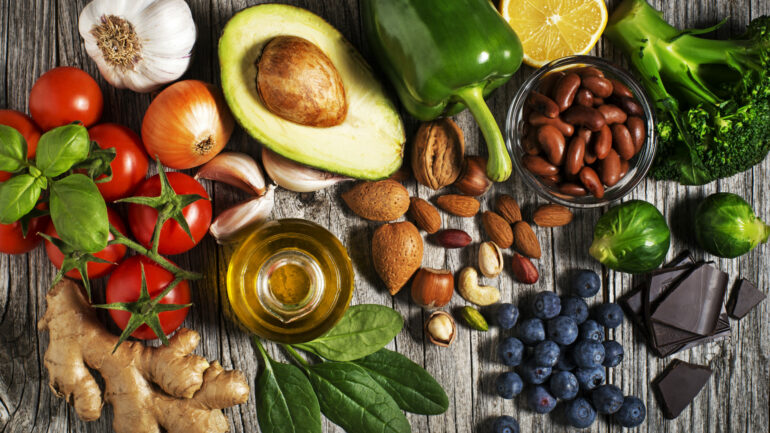Antioxidant vitamins play a crucial role in maintaining our overall health and well-being. They protect our cells from damage caused by free radicals, which are unstable molecules that can lead to chronic diseases and aging. In this comprehensive guide, we’ll explore the power of antioxidant vitamins, their benefits, sources, and how to incorporate them into your daily routine.
Understanding Antioxidants and Free Radicals
What Are Antioxidants?
Antioxidants are compounds that inhibit oxidation, a chemical reaction that produces free radicals. Free radicals are molecules with an unpaired electron, making them highly reactive and capable of damaging cells, proteins, and DNA. Antioxidants neutralize free radicals, preventing them from causing harm and thereby protecting our bodies from various diseases and the aging process.
What Are Free Radicals?
Free radicals are unstable molecules that are produced naturally in the body as a byproduct of normal metabolic processes. They can also be generated by external factors such as pollution, radiation, cigarette smoke, and certain chemicals. While our bodies have natural defenses against free radicals, an excess of these harmful molecules can overwhelm our system, leading to oxidative stress.
How Do Antioxidants Work?
Antioxidants work by donating an electron to free radicals, stabilizing them and preventing them from causing cellular damage. This process helps to maintain the integrity of cells and supports overall health. Different antioxidants protect different parts of the cell and body, working together to provide comprehensive protection.
Key Antioxidant Vitamins and Their Benefits
Vitamin A
Vitamin A is a fat-soluble vitamin that plays a critical role in maintaining healthy vision, skin, and immune function. It exists in two forms: preformed vitamin A (retinol) found in animal products, and provitamin A (beta-carotene) found in plant-based foods.
Benefits of Vitamin A
- Eye Health: Vitamin A is essential for maintaining healthy vision and preventing night blindness and age-related macular degeneration.
- Immune Support: It enhances the function of immune cells, helping to protect against infections.
- Skin Health: Vitamin A promotes healthy skin by stimulating the production of new skin cells and reducing the risk of acne.
Sources of Vitamin A
- Animal Sources: Liver, fish oil, eggs, and dairy products.
- Plant Sources: Carrots, sweet potatoes, spinach, and other leafy green vegetables.
Vitamin C
Vitamin C, also known as ascorbic acid, is a water-soluble vitamin that acts as a powerful antioxidant. It is crucial for the synthesis of collagen, absorption of iron, and the maintenance of the immune system.
Benefits of Vitamin C
- Immune Support: Vitamin C boosts the immune system, helping to protect against colds and infections.
- Skin Health: It promotes collagen production, essential for healthy skin, wound healing, and the prevention of wrinkles.
- Iron Absorption: Vitamin C enhances the absorption of non-heme iron from plant-based foods, reducing the risk of anemia.
Sources of Vitamin C
- Fruits: Oranges, strawberries, kiwi, and papaya.
- Vegetables: Bell peppers, broccoli, Brussels sprouts, and spinach.
Vitamin E
Vitamin E is a fat-soluble antioxidant that protects cell membranes from oxidative damage. It is also essential for immune function and skin health.
Benefits of Vitamin E
- Cell Protection: Vitamin E protects cell membranes from oxidative damage, reducing the risk of chronic diseases.
- Skin Health: It promotes skin healing and reduces the appearance of scars and wrinkles.
- Heart Health: Vitamin E helps prevent the oxidation of LDL cholesterol, which can reduce the risk of heart disease.
Sources of Vitamin E
- Nuts and Seeds: Almonds, sunflower seeds, and hazelnuts.
- Oils: Sunflower oil, safflower oil, and wheat germ oil.
- Vegetables: Spinach, broccoli, and avocados.
Vitamin K
Vitamin K is a fat-soluble vitamin known for its role in blood clotting and bone health. It also exhibits antioxidant properties that contribute to overall health.
Benefits of Vitamin K
- Blood Clotting: Vitamin K is essential for the production of proteins that regulate blood clotting.
- Bone Health: It supports bone health by aiding the regulation of calcium, reducing the risk of osteoporosis.
- Heart Health: Vitamin K helps prevent arterial calcification, promoting cardiovascular health.
Sources of Vitamin K
- Leafy Greens: Kale, spinach, and broccoli.
- Vegetables: Brussels sprouts and cabbage.
- Fermented Foods: Natto (fermented soybeans).
The Synergistic Effects of Antioxidant Vitamins
Antioxidant vitamins often work together synergistically to enhance their protective effects. For example, vitamin C can regenerate vitamin E after it has neutralized a free radical. This collaboration between antioxidants provides a more robust defense against oxidative stress.
Combining Antioxidants for Maximum Benefit
- Vitamin C and E: Together, they offer enhanced protection against free radical damage.
- Vitamin A and C: These vitamins work together to support skin health and boost the immune system.
- Vitamin K and E: They collaborate to promote cardiovascular health by preventing arterial calcification.
How to Incorporate Antioxidant Vitamins into Your Diet
Balanced Diet
The best way to ensure adequate intake of antioxidant vitamins is through a balanced diet rich in fruits, vegetables, nuts, and whole grains. Aim to consume a variety of colorful foods to obtain a broad spectrum of antioxidants.
Supplementation
While it is ideal to get antioxidants from food sources, supplementation can be beneficial in certain cases, such as dietary restrictions or specific health conditions. It is important to consult with a healthcare professional before starting any supplement regimen.
Tips for Maximizing Antioxidant Intake
- Eat the Rainbow: Incorporate a variety of colorful fruits and vegetables into your meals.
- Choose Whole Foods: Opt for whole, minimally processed foods to ensure maximum nutrient retention.
- Healthy Fats: Include healthy fats, such as those from nuts, seeds, and avocados, to enhance the absorption of fat-soluble vitamins (A, D, E, K).
Frequently Asked Questions
What are the best sources of antioxidant vitamins?
The best sources of antioxidant vitamins include fruits, vegetables, nuts, seeds, and whole grains. Specific examples include oranges (vitamin C), almonds (vitamin E), and carrots (vitamin A).
Can I get enough antioxidant vitamins from my diet alone?
Yes, it is possible to get enough antioxidant vitamins from a well-balanced diet rich in fruits, vegetables, and other whole foods. However, in certain cases, supplementation may be necessary.
Are there any risks associated with taking antioxidant vitamin supplements?
Taking antioxidant vitamin supplements in excessive amounts can lead to adverse effects. For example, high doses of vitamin A can be toxic, and excessive vitamin E supplementation can increase the risk of bleeding. Always consult with a healthcare professional before starting any supplements.
How do antioxidant vitamins benefit skin health?
Antioxidant vitamins, such as vitamins C and E, promote skin health by protecting against UV damage, supporting collagen production, and reducing the appearance of wrinkles and scars.
Can antioxidant vitamins help prevent chronic diseases?
Yes, antioxidant vitamins can help prevent chronic diseases by neutralizing free radicals, reducing oxidative stress, and supporting overall cellular health. They have been linked to a lower risk of heart disease, certain cancers, and age-related conditions.
How can I ensure I’m getting enough vitamin E in my diet?
To ensure adequate vitamin E intake, include nuts, seeds, and vegetable oils in your diet. Foods such as almonds, sunflower seeds, and spinach are excellent sources of vitamin E.
Is it better to get antioxidants from food or supplements?
It is generally better to get antioxidants from food, as whole foods provide a complex array of nutrients that work synergistically. However, supplements can be beneficial in certain cases, such as dietary restrictions or specific health needs.
What is the role of vitamin A in immune function?
Vitamin A plays a crucial role in immune function by supporting the production and activity of white blood cells, which help fight off infections and maintain the integrity of mucosal barriers.
How do vitamins C and E work together to protect cells?
Vitamin C can regenerate vitamin E after it has neutralized a free radical, enhancing the overall antioxidant defense system. This synergistic relationship provides more effective protection against oxidative damage.
Can antioxidant vitamins improve heart health?
Yes, antioxidant vitamins can improve heart health by preventing the oxidation of LDL cholesterol, reducing inflammation, and supporting healthy blood vessels. Vitamins C, E, and K are particularly beneficial for cardiovascular health.
Conclusion
Antioxidant vitamins play a vital role in protecting our bodies from oxidative stress, supporting immune function, and promoting overall health. By incorporating a variety of fruits, vegetables, nuts, and whole grains into your diet, you can ensure an adequate intake of these powerful nutrients. Remember to consult with a healthcare professional before starting any supplementation, and aim for a balanced, whole-food-based diet to maximize the benefits of antioxidant vitamins.
- Traptox Aka Trapezius Botox Treatment Near Kingston Upon Thames, Surrey - January 4, 2025
- Imprisonment Fetish: The Fantasy Of Captivity And Control - January 2, 2025
- Skin Injectables Near Westcott, Surrey - January 1, 2025

